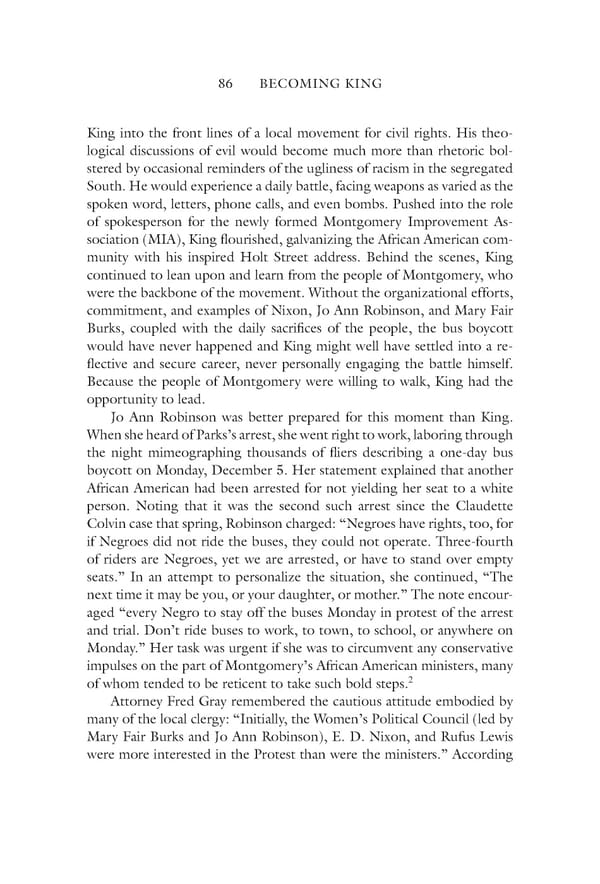86 BECOMING KING King into the front lines of a local movement for civil rights. His theo- logical discussions of evil would become much more than rhetoric bol- stered by occasional reminders of the ugliness of racism in the segregated South. He would experience a daily battle, facing weapons as varied as the spoken word, letters, phone calls, and even bombs. Pushed into the role of spokesperson for the newly formed Montgomery Improvement As- sociation (MIA), King flourished, galvanizing the African American com- munity with his inspired Holt Street address. Behind the scenes, King continued to lean upon and learn from the people of Montgomery, who were the backbone of the movement. Without the organizational efforts, commitment, and examples of Nixon, Jo Ann Robinson, and Mary Fair Burks, coupled with the daily sacrifices of the people, the bus boycott would have never happened and King might well have settled into a re- flective and secure career, never personally engaging the battle himself. Because the people of Montgomery were willing to walk, King had the opportunity to lead. Jo Ann Robinson was better prepared for this moment than King. When she heard of Parks’s arrest, she went right to work, laboring through the night mimeographing thousands of fliers describing a one-day bus boycott on Monday, December 5. Her statement explained that another African American had been arrested for not yielding her seat to a white person. Noting that it was the second such arrest since the Claudette Colvin case that spring, Robinson charged: “Negroes have rights, too, for if Negroes did not ride the buses, they could not operate. Three-fourth of riders are Negroes, yet we are arrested, or have to stand over empty seats.” In an attempt to personalize the situation, she continued, “The next time it may be you, or your daughter, or mother.” The note encour- aged “every Negro to stay off the buses Monday in protest of the arrest and trial. Don’t ride buses to work, to town, to school, or anywhere on Monday.” Her task was urgent if she was to circumvent any conservative impulses on the part of Montgomery’s African American ministers, many 2 of whom tended to be reticent to take such bold steps. Attorney Fred Gray remembered the cautious attitude embodied by many of the local clergy: “Initially, the Women’s Political Council (led by Mary Fair Burks and Jo Ann Robinson), E. D. Nixon, and Rufus Lewis were more interested in the Protest than were the ministers.” According
 Becoming King: Martin Luther King Jr. Page 106 Page 108
Becoming King: Martin Luther King Jr. Page 106 Page 108